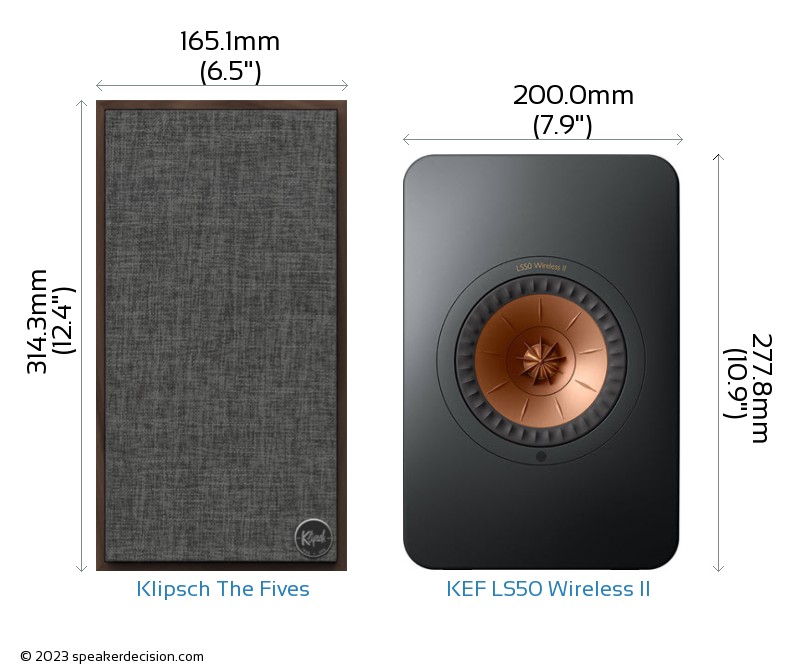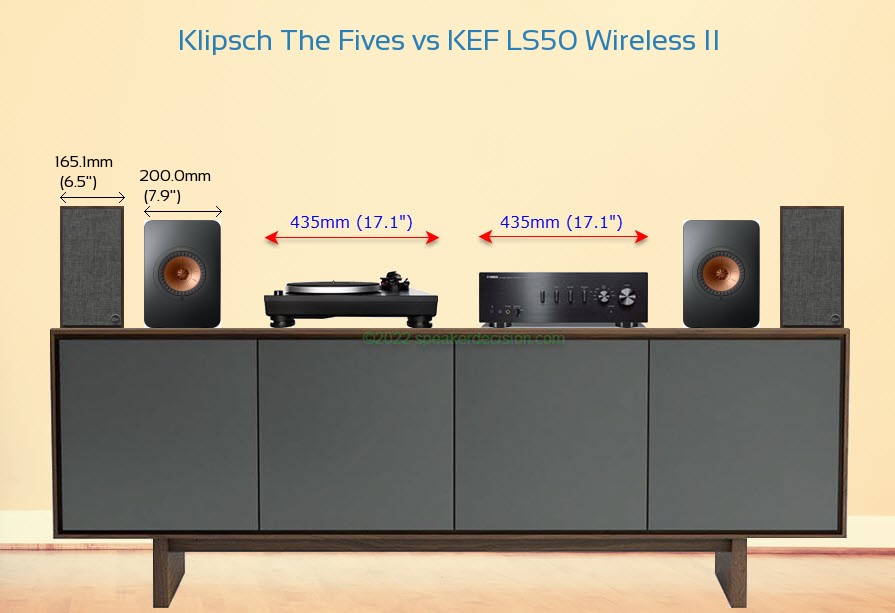In this review, we will be comparing The Fives and LS50 Wireless II, two Powered Bookshelf speakers from Klipsch and KEF. Being Powered speakers, they both have built-in amplifiers so you don't need an external power amp or an integrated amp to power them.
Let's have a brief look at the main features
of Klipsch The Fives and KEF LS50 Wireless II first before getting into our more
detailed comparison.
Klipsch The Fives Key Specs
- 2-way Design
- 160-watt RMS( 320-watt Peak) Integrated Amplifier
- 1" Tractrix Horn Tweeter
- 4.5" Fiber-composite Woofer
- 50-25k Hz Frequency Response
- 24-bit Max Depth / 192 kHz Max Sample Rate
- Built-in 5.0 Bluetooth
- App Control Feature
- Weight:4.85kg
- Dimensions (H x W x D): 314.3" x 6.5" x 11.125"( 314.3 x 165.1 x 282.6mm )
KEF LS50 Wireless II Key Specs
- 2-way Design
- 380-watt RMS( 760-watt Peak) Integrated Amplifier
- 12th Generation Uni-Q Driver
- 1" Hard-Dome Tweeter
- 5.25" Aluminum Woofer
- 45-28k Hz Frequency Response
- 32-bit Max Depth / 384 kHz Max Sample Rate
- Built-in 4.2 Bluetooth
- App Control Feature
- Weight:10.00kg
- Dimensions (H x W x D): 277.8" x 7.875" x 12.6875"( 277.8 x 200.0 x 322.3mm )
In the following sections, we will get into more detail in order to better understand how the Klipsch The Fives and KEF LS50 Wireless II compare and hopefully end up with enough arguments to decide which one of these loudspeakers is the better choice for you.
**This post contains affiliate links, and I will be compensated if you make a purchase after clicking
through my links. As an Amazon Associate I earn from qualifying purchases.
Drivers
Both The Fives and LS50 Wireless II are 2-way speakers.
| Driver |
Klipsch The Fives |
KEF LS50 Wireless II |
|
Driver Setup
|
2-way
|
2-way
|
|
Tweeter
|
1-inch
|
1-inch
|
|
Midrange
|
- |
- |
|
Woofer
|
1 x 4.5-inch
|
1 x 5.25-inch
|
The Fives features a 1" Titanium Tractrix Horn Tweeter and 1 x 4.5" Fiber-composite Woofer . On the other hand, the LS50 Wireless II features a 1" Aluminum Hard-Dome Tweeter and 1 x 5.25" Aluminum Woofer .
Frequency Response
The Fives has a frequency range of 50-25k Hz whereas LS50 Wireless II has a frequency range of 45-28k Hz. With a minimum frequency of 45Hz, the LS50 Wireless II can go significantly deeper on the low side and provide stronger bass compared to the The Fives's min frequency of 50Hz.
Below graphs depict how these two speakers compare with the max, min and average values of the Min and Max Frequencies of other speakers in the Bookshelf class in our database.
Low Frequency
Bookshelf Speakers
High Frequency
Bookshelf Speakers
None of these speakers achieves full range experience which is commonly agreed as 20Hz-20kHz. In order to achieve lower lows / deeper bass, we recommend you pair these with a subwoofer. Visit our Powered Subwoofers section to find out more about the available options.
Cabinet Type and Port Position
Both The Fives and LS50 Wireless II have rear firing ports. Rear ported speakers generally need more room between the backside of the speaker and the wall compared to sealed and front/bottom ported speakers. Placing the speakers too close to the walls may cause the bass to sound boomy.
If you are limited in space and can't get the speakers away from the backwall, check our Speakers with Front Firing Ports page.
Physical Specs
Size of a speaker can sometimes become an important decision factor due to space constraints or in some cases purely for esthetic reasons. In this section, we are going to compare Klipsch The Fives's and KEF LS50 Wireless II's external dimensions. Klipsch The Fives has external dimensions of 314.3 x 165.1 x 282.6mm ( 12.375 x 6.5 x 11.125inch) whereas KEF LS50 Wireless II has external dimensions of 277.8 x 200.0 x 322.3mm ( 10.9375 x 7.875 x 12.6875inch) .
Klipsch The Fives is 34.9mm narrower and 39.7mm less deeper than KEF LS50 Wireless II but it is also 36.5mm taller.
Below you can see the front view size comparison of Klipsch The Fives and KEF LS50 Wireless II in scale.
 Comparison image of Klipsch The Fives and KEF LS50 Wireless II Size and External Dimensions
Comparison image of Klipsch The Fives and KEF LS50 Wireless II Size and External Dimensions
Base Surface Area Comparison
Base surface area of a loudspeaker may become a determining factor when the space in your room or desk is limited.
The base surface area of the Klipsch The Fives is approximately 466.6cm2 / 72.3inch2 and base area of the KEF LS50 Wireless II is approximately 644.6cm2 / 99.9inch2. The The Fives requires 28% less surface area than the LS50 Wireless II which gives it a small advantage on placement in tight spaces.
Here is an another comparison that shows both speakers on a BDI Octave Media Cabinet, next to a standard size amplifier and turntable in scale:
 Size Comparison image of Klipsch The Fives and KEF LS50 Wireless II on a Media Console
Size Comparison image of Klipsch The Fives and KEF LS50 Wireless II on a Media Console